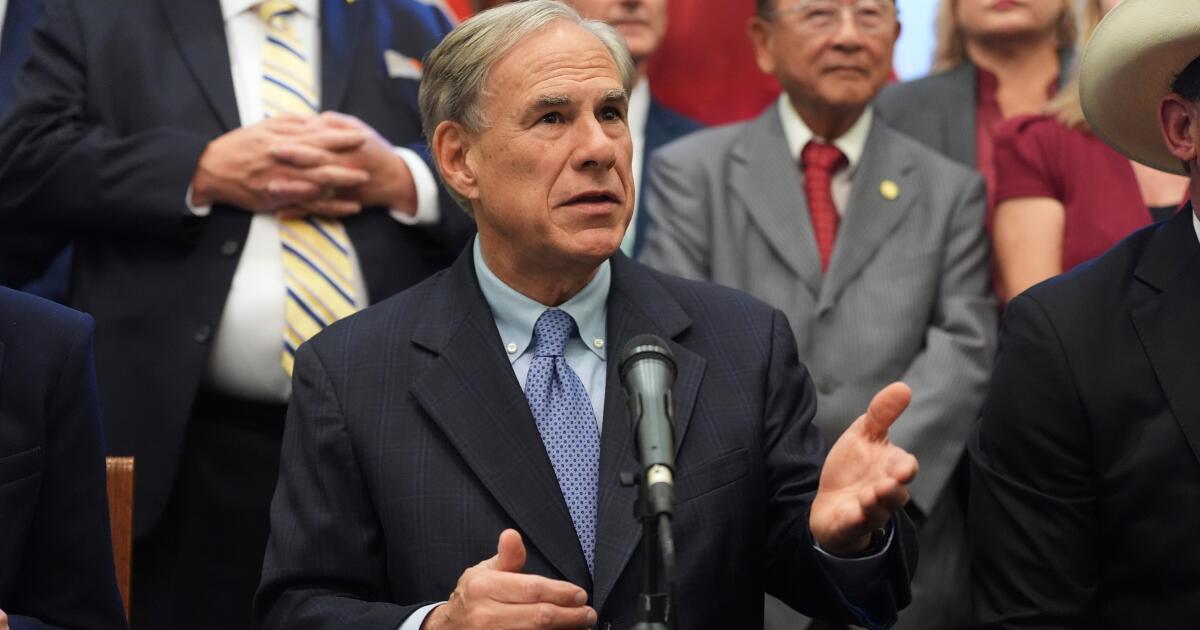Texas Republicans turn Muslims into new political scapegoat
Imagine if a candidate for, say, the California Assembly appeared at a political event and delivered the following remarks:
“No to kosher meat. No to yarmulkes. No to celebrating Easter. No, no, no.”
He, or she, would be roundly — and rightly — criticized for their bigotry and raw prejudice.
Recently, at a candidates forum outside Dallas, Larry Brock expressed the following sentiments as part of a lengthy disquisition on the Muslim faith.
“We should ban the burqa, the hijab, the abaya, the niqab,” said the candidate for state representative, referring to the coverings worn by some Muslim women. “No to halal meat. No to celebrating Ramadan. No, no, no.”
Brock, whose comments were reported by the New York Times, is plainly a bigot. (He’s also a convicted felon, sentenced to two years in prison for invading the U.S. Capitol on Jan. 6. No to hand-slaughtered lamb. Yes to despoiling our seat of government.)
Brock is no outlier.
For many Texas Republicans running in the March 3 primary, Islamophobia has become a central portion of their election plank, as a longtime political lance — illegal immigration — has grown dull around its edges.
Aaron Reitz, a candidate for attorney general, aired an ad accusing politicians of importing “millions of Muslims into our country.”
“The result?” he says, with a tough-guy glower. “More terrorism, more crime. And they even want their own illegal cities in Texas to impose sharia law.” (More on that in a moment.)
One of his opponents, Republican Rep. Chip Roy — co-founder of the “Sharia-Free America Caucus” — has called for amending the Texas Constitution to protect the state’s tender soil from Islamification by “radical Marxists.”
In the fierce GOP race for U.S. Senate, incumbent John Cornyn — facing a potentially career-ending challenge from state Atty. Gen. Ken Paxton — has aired one TV spot accusing his fellow Republican of being “soft on radical Islam” and another describing radical Islam “as a bloodthirsty ideology.”
Paxton countered by calling Cornyn’s assertions a desperate attack “that can’t erase the fact that he helped radical Islamic Afghans invade Texas,” a reference to a visa program that allowed people who helped U.S. forces — in other words friends and allies — to come to America after being carefully screened.
There hasn’t been such a concentrated, sulfurous political assault on Muslims since the angst-ridden days following the Sept. 11 attacks.
In just the latest instance, Democrats are calling for the censure of Florida Republican Rep. Randy Fine after he wrote Sunday on X: “If they force us to choose, the choice between dogs and Muslims is not a difficult one.” He’s since doubled down by posting several images of dogs with the words “Don’t tread on me.”
In Texas, the venom starts at the top with Republican Gov. Greg Abbott, who’s waltzing toward reelection to an unprecedented fourth term.
In November, Abbott issued an executive order designating the Muslim Brotherhood and the Council on American-Islamic Relations — the latter a prominent civil rights group — as terrorist organizations.
Not to be out-demagogued, Bo French, a candidate for Texas Railroad Commission, called on President Trump to round up and deport every Muslim in America. (French, the former Tarrant County GOP chair, gained notoriety last year for posting an online poll asking, “Who is a bigger threat to America?” The choice: Jews or Muslims.)
Much of the Republican hysteria has focused on a proposed real estate development in a corn- and hayfield 40 miles east of Dallas.
The master-planned community of about 1,000 homes, known as EPIC City, was initiated by the East Plano Islamic Center to serve as a Muslim-centered community for the region’s growing number of worshipers. (Of course, anyone could choose to live there, regardless of their religious faith.)
Paxton said he would investigate the proposed development as a “potentially illegal ‘Sharia City.’ ” The U.S. Department of Housing and Urban Development last week jumped in with its own investigation — a move Abbott hailed — after the Justice Department quietly closed a probe into the project, saying developers agreed to abide by federal fair housing laws. That investigation came at the behest of Cornyn.
The rampant resurgence of anti-Muslim sentiment hardly seems coincidental.
For years, Republicans capitalized on the issues of illegal immigration and lax enforcement along the U.S. -Mexico border. With illegal crossings slowed to a trickle under Trump, “Republicans can’t run on the border issue the way [they] have in the past,” said Jim Henson, director of the Texas Politics Project at the University of Texas at Austin.
What’s more, cracking down on immigration no longer brings together Republicans the way it once did.
General support for Trump’s get-tough policies surpasses 80% among Texas Republicans, said Henson, who’s spent nearly two decades sampling public opinion in the state. But support falls dramatically, into roughly the high-40s to mid-50s, when it comes to specifics such as arresting people at church, or seizing them when they make required court appearances.
“Republicans need to find something else that taps into those cultural-identity issues” and unifies and animates the GOP base, said Henson.
In short, the fearmongers need a new scapegoat.
Muslims are about 2% of the adult population in Texas, according to the Pew Research Center’s Religious Landscape Study, completed in 2024. That works out to estimates ranging from 300,000 to 500,000 residents in a state of nearly 32 million residents.
Not a huge number.
But enough for heedless politicians hell-bent on getting themselves elected, even if it means tearing down a whole group of people in the process.
